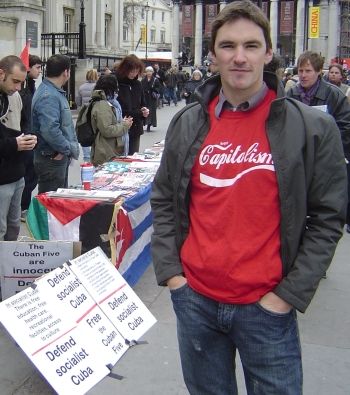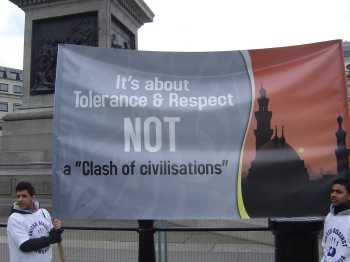We are developing the social individualist meta-context for the future. From the very serious to the extremely frivolous... lets see what is on the mind of the Samizdata people.
Samizdata, derived from Samizdat /n. - a system of clandestine publication of banned literature in the USSR [Russ.,= self-publishing house]
|
The demonstration in Trafalgar square, supported by dhimmi-in-chief for London Ken Livingston, was clearly orchestrated to show a homogenised face of ‘moderate Islam’ for the world to see. An interesting feature of the demo was that no ‘home made placards’ were tolerated by the organisers. A small group of Kurds turned up with their own signs and were fairly quickly handed the printed blue-white official signs. I was not quick enough to get a picture of the Kurdish ones before they vanished as I did not expect them to be taken down, but the ones in English were fairly anodyne.

Not even in Islamic green! I would guess maybe 7,000 people showed up, perhaps 10,000 tops, at least by the time I lost interest around 3:00 and wandered off to a nearby computer faire. Many of the usual suspects were there, such as the inevitable socialist workers and CND set…

Quite what wicked old Blair and BushMcHitler have to do with protesting against cartoons of Mohammed in Denmark was not clear

Hands off secular fascist police states and theocratic police states!

You can be sure those naughty cartoons (or that tee-shirt) would not have been allowed in Cuba! The large official signs were clearly expensive high quality creations and contained all manner of utterly irrelevant slogans designed to appeal to the ‘hard of thinking’.

So if some Muslim desires sharia law for themselves, presumably this is what he also wishes for me… Oh I feel much better now!

Tolerance? Sure, it is yours by right. Respect? You must be joking, that you have to earn

Jyllands-Posten did not ‘incite’ to violence, they just defended free expression, unlike some others we know of. Respect however has nothing to do with it
And just to remind people what this is really about…

The Danish embassy in London under police guard And one final picture which tickled my sense of irony… a pleasant looking young woman watching the demonstration in her stylish Christian Dior scarf.
So if hippophobia is a morbid fear of horses… what would a morbid fear of hippototamii be known as?
The European Union is making soothing clucking sounds to try and calm the outraged Muslim masses with plans of a ‘media code of conduct’ designed to prevent a repeat of the Jyllands-Posten incident with the ‘Satanic Cartoons’.
EU Justice and Security Commissioner Franco Frattini said the charter would encourage the media to show “prudence” when covering religion.
“The press will give the Muslim world the message: We are aware of the consequences of exercising the right of free expression,” he told the newspaper. “We can and we are ready to self-regulate that right.”
Who is this “we”? Does Frattini think he is speaking for the British and European on-line community? If so then perhaps I can spell out the “consequences of exercising the right of free expression” that “we” are aware of… it makes us free, that is the consequence of free expression. Are “we” clear now? These non-enforcible guidelines are just a worthless sop to people who need to be confronted, not treated as though they have a legitimate argument.
And yet later he seems to take a strangely different stance…
The chairman of World Islamic Call Society, Mohamed Ahmed Sherif told a press conference in Brussels on Thursday (9 February) that the cartoons of Mohammed published first in Danish daily Jyllands-Posten, fuelled extremism.
“Nobody should blame the muslims if they are unhappy about the images of the prophet Mohammed,” Sherif said coming out from a meeting with EU justice commissioner Franco Frattini in Brussels. “It’s forbidden to create a hate programme to show that the prophet is a terrorist while he’s not,” he stated, “Don’t ask us to try to make people understand that this is not a campaign of hate.”
EU justice commissioner Franco Frattini repeatedly nodded and mumbled “yes” in front of cameras and microphones during Mr Sherif’s statement.
Mr Frattini also denied wanting to create a code of conduct for journalists reporting on religious matters, as indicated by earlier media reports.
“There have never been, nor will there be any plans by the European Commission to have some sort of EU regulation, nor is there any legal basis for doing so,” the commissioner stated.
So in the space of two days, Frattini seems to have done a U-turn and stated his commitment to freedom of expression whilst simultaneously looking like an appeaser. That takes some doing!
Let’s hear it for ‘nuanced’ European diplomacy! 
The Danish media has taken note of the Buy Danish campaigns that have sprung up spontaneously over the least week or so in response to the boycott from Islamic countries. Danes seem to be quite willing to stoutly resist the pressure to limit free speech but it is important they realise that millions of people worldwide are urging them to stand firm and so although buying Danish goods or putting a supportive graphic on your site may be a token, it is by no means pointless. Below is a translation of an article in Børsen.
Buy Danish campaigns in large markets like the USA and Germany might give Danish companies enough increased turnover to cover the losses from the Arabian boycotts.
Companies like Arla, Lego, and Carlsberg believe in increased sales when they check their books next time, and Dominique Bouchet, professor in marketing and sociology at the University of Southern Denmark also expects a plus.
“It just might give a good effect. Normally there is a greater effect the other way around, when you signal disgust and irritation through a boycott. But the present situation is completely unusual, and many dislikes the Muslim boycott and the extremists reactions to the drawings. It is expressed through the buying of Danish goods”, says Dominique Bouchet.
He emphasises that there has never been comparable situations, so it is difficult to predict how large the effect will become.
Denmark is, as most people are aware, caught in the middle of a Middle Eastern sandwich, where the hateful reactions to the Prophet drawings have become so extreme that the crisis is going straight on to front pages in media around the world.
This releases a counter expression via buy Danish campaigns, where the customers are encouraged to buy Danish goods to support Denmark in the conflict. A simple search on Google gives more than 100.000 “buy Danish” pages.”
With thanks to Kristina for the translation.
I wrote to the Department of Culture, Media & Sport (!) back on 10th January to nominate the CCTV camera as an ‘icon of England’… and they have just written back accepting the nomination.
Interesting.
Muslim Action Committee are calling for changes to the law in Britain to implement an aspect of sharia law and they want the British state to do it for them. What they want is to legally ban people from displaying pictures of Mohammed, the seventh century warlord who founded their religion, because it annoys them. Never mind that showing images of this historical figure does not threaten them with violence or prevent their exercise of religion, they want to make it illegal to annoy them.
They are planning to stage a protest march in London on 18 February, expecting to attract 20,000 to 50,000 people. I hope the number is considerably larger because I am sure as hell going to be there expressing my views as well.
If they get their way, we will undoubtedly be prosecuted as Samizdata’s response to this islamo-fascist proposal will be a “Mohammed Picture of the Day”, each day and every day until hell freezes over or we run out of server space. Intolerant Islam does not like being annoyed? Well guys, you ain’t seen nothing yet, I promise you that. Our Dutch friends at The Amazing Retecool are a fairly good place to start for interesting interpretations of Mohammed’s image.
If this ever becomes law and I personally get dragged into court over what Samizdata will most certainly do, rest assured that as we are hosted in the USA we will remain on-line and ‘expressive’ regardless, even if I have to ‘host’ myself in the USA a few years earlier that I expected. So to all your intolerant Islamic fascists out there who think it is within your power to silence all the voices you dislike, with all due respect (i.e. none), you are very much mistaken.
… in October of last year and nothing happened.
So obviously it took a while for the people who wanted to blow this up some time to get all those highly inflammable Danish flags made and organise the outrage. Maybe we are looking in all the wrong places for the people behind this. Radical Islamic clerics? Nah, it was all a conspiracy by Middle Eastern flag makers.
The main thing that the Jyllands-Posten incident was intended to do was to assert the right of freedom of expression as a way of defending that right, and they succeeded beyond their wildest dreams.
Given the climate of abridgement regarding freedom of expression and civil rights generally in Britain and elsewhere, I can only offer my heartfelt thanks to not just Flemming Rose of Jyllands-Posten for publishing those aesthetically unremarkable cartoons and forcing this issue onto the front page where it belongs, but to everyone involved in this drama.
In other words I would like to thank not just those august Danes but also offer a hat-tip to the millions of screaming Muslim activists and blood curdling placard bearing demonstrators who underlined and put into bold what those Danes did, giving them publicity but above all proving their point. If you guys had not taken the bait hook, line and sinker, this would have been a non-event.
Yet now only the most gibbering purblind Chomskyite will claim that Muslim activists have not created a climate of fear and intimidation regarding what people can and cannot say about them, or that is it all about Israel (sorry, Palestine) and BushMcHitler. Without the help and support of all those guys in Kabul, London, Beirut, Cairo, Copenhagen and Damascus, this incident would have been a foot note rather than a global headline. As I have said before, with enemies like them, who needs friends?
We now have a powerful set of memes to use against the enemies of liberty, both domestic and foreign. I suggest we use them for all they are worth and assert our rights, continually pushing the boundaries just to defend what we have. Someone wants to curtail what you can say? Point out they are appeasing the guys with the signs reading “WE WILL BEHEAD ANY WHO INSULT ISLAM”.
We must also refuse to tolerate the intolerance that wraps itself in worlds like ‘respect’ and ‘acceptance’ because whilst we must tolerate our enemies provided they do not threaten us with force, we should feel no obligation to respect them or to accept their views any more than they must respect or accept us.
Tolerance for us however is non-negotiable and methinks it is time to stop being polite when we make that point .
Update: this is something these guys understand.
I get the impression that somewhere in France, a middle finger is being raised.
Update: It has been suggested that this be printed on a tee-shirt with the following caption…

My Imam went to Mecca and all he got me was this lousy Tee-shirt Sorry, I just had to share that 
The Cardiff University newspaper Gair Rhydd [link down as of late 7 Feb] reprinted one of the Jyllands-Posten ‘Satanic Cartoons’ and as a result, the edition was recalled and pulped by the university authorities. Now as the paper is no doubt the property of the university, I do not contest their right to do as they please with their property. However the statements from them make no sence whatsoever
“The opinions expressed in that publication are those of the editorial team independently of the students’ union or university. The editorial team enjoy the normal freedoms and independence associated with the press in the UK, and are expected to exercise those freedoms with responsibility.”
So they recalled the edition, destroyed all the copies, suspended the editor and are ‘investigating’ three of their journalists but the editorial team enjoy the normal freedoms and independence associated with the press in the UK. As we say on the internet, WTF?
Several newspapers in Europe and elsewhere (and I do not mean student newspapers) have reprinted the cartoons, so this is hardly an act of unprofessional behaviour seeing as several editors who actually do this for a living decided it was in the interests of their readers to publish the damn things.
Had they said “it is our paper and we will pulp anything that bucks the party line”, well fine, but please, I will thank Cardiff University to not declaim as if they were on the moral high ground when all they are doing is covering their politically correct arses.
On the Adam Smith Institute blog, Eamonn Butler points out that millions of people in the USA who vote Republican and Democrat nevertheless subscribe to values which are broadly ‘libertarian’.
And of course when you add in the millions who decline to vote at all not (just) because of apathy but because there is no party which really reflects their world view (and that may well include the US Libertarian Party), it does make you wonder at the disconnect between those numbers and what you see reflected in the media and political system.
I am often asked why so many libertarians/classical liberals/minarchists are averse to pursuing careers in politics and I usually reply that the question is like asking why so many honest people do not pursue careers in mugging and armed robbery.
This is why we are at an inherent disadvantage against statists when playing by their rules and why I have long suspected that the idea of small-state parties may be a waste of time*. The type of people who are attracted to politics are almost always psychologically predisposed to solutions which are force based as a preference to some social solution, particular as it is rare for force to be effectively directed back at them personally in a non-abstract way. As I have said before, people who go into politics generally have more in common with members of street gangs (although with less need for personal fortitude) both psychologically and morally than with most of the people who vote for them. Do Tory or Republican politicians really want to wield significantly less power over the nation when it is their turn in power compared to their Labour or Democrat counter-parts? It is very hard indeed to be a genuinely decent person and a politician.
* = I would be more than happy to be convinced I am wrong on this
This call [original link removed] for a rally in Trafalgar Square next Saturday is interesting. Does anyone know any more details of who is behind it? I would like to know more before leaping to any conclusions.
update: question answered – not worth supporting one group of (white) fascists protesting against another group of (Islamic) fascists
|
Who Are We? The Samizdata people are a bunch of sinister and heavily armed globalist illuminati who seek to infect the entire world with the values of personal liberty and several property. Amongst our many crimes is a sense of humour and the intermittent use of British spelling.
We are also a varied group made up of social individualists, classical liberals, whigs, libertarians, extropians, futurists, ‘Porcupines’, Karl Popper fetishists, recovering neo-conservatives, crazed Ayn Rand worshipers, over-caffeinated Virginia Postrel devotees, witty Frédéric Bastiat wannabes, cypherpunks, minarchists, kritarchists and wild-eyed anarcho-capitalists from Britain, North America, Australia and Europe.
|














